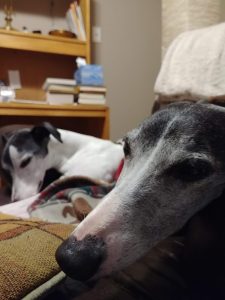Hi, and welcome to my blog! My name is Grace, and I use she/her and they/them pronouns. I’m an English and GRSJ major in my final year at UBC. I’m currently living on Vancouver Island with my two dogs, Pongo and Flash. The three of us love to curl up together in a cozy corner with a good book, which is what inspired this blog’s name! So, sit back, relax, and enjoy the Reading Corner.
My understanding of this course is that we will be investigating the category of “Canadian” literature, paying particular attention to the relationship between European and Indigenous storytelling. I expect our readings and discussions will encourage deep, critical thinking about settler colonialism and anti-Indigenous racism, and how these structures interlock with literary, oratory, and “other” stories.
I will be writing all my blogs posts (and completing the other coursework) from my Island abode. I think it is important, even–or perhaps especially–in the increasingly abstract virtual environments that we find ourselves in, to acknowledge the actual land one occupies. So… in addition to my connection to UBC and the territories its campuses are found within, I and my blog are situated on the traditional, ancestral, and unceded territories of the Qualicum, Snaw-naw-as, and Snuneymuxw peoples. As this course continues I plan to think more about land acknowledgements and how they can relate to storytelling, and the web of responsibility that I am a part of.

Flash (foreground) and Pongo (background) are whippets, a medium-sized sight hound.
As those of you reading this may have realized, in addition to books, I also really like dogs! I think they’re cool creatures, and the relationships they form with humans are also neat. On one level, dogs and humans have evolved to form symbiotic partnerships with each other. The appearance, characteristics, and other traits that dogs have–such as Flash’s long, handsome nose–emerged because they ostensibly served a function. On another level, dogs and humans also have, I believe, the ability to form bonds outside the context of utility…
While I’m on the subject, I should share an interesting historical fact I know about dogs and Canada! Indigenous people here actually lived alongside their own unique domesticated dogs breeds for about 5,000 years before settlers arrived. Unfortunately, none of these dog breeds currently exist today–however, the knowledge of these dogs and how they lived with these people remains. I like to imagine that, like myself, these bygone humans also enjoyed sharing a good story with their canine friends.
Works Cited
Kachur, Torah. “Original North American dog population wiped out in recent history.” CBC News, 5 Jul. 2018, www.cbc.ca/news/canada/indigenous-north-american-dog-population-wiped-out-1.4626864.
Leathlobhair, Máire Ní, et al. “The evolutionary history of dogs in the Americas.” Science, vol. 361, no. 639, Jul. 2018, pp. 81-85, DOI: 10.1126/science.aao4776.